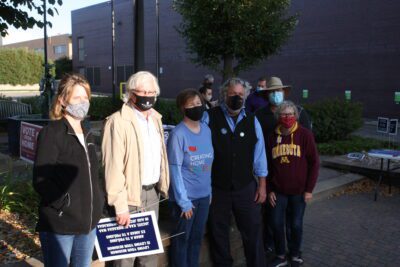
I have a sign in my yard. Perhaps you do, too. We’re surrounded by messages promoting—or opposing—specific people and ideas.
I picked up my sign while attending Willmar’s Creating Home Together through Art event. It was one of four community gatherings we sponsored this fall with Pioneer PBS to celebrate Welcoming Week and the benefits of creating safe, welcoming communities. Local volunteers, artists and organizations shared resources and led activities.
Willmar Interfaith Network is a collaborative network of faith leaders representing the diverse cultures and traditions that make up the community. Members create space for conversation and education, promote interfaith activities and build relationships across cultures. At the Welcoming Week event, they passed out signs that read, “We Are Better Together.”
It’s something that rural communities do very well: Come together in difficult times.
Coming together does not mean setting aside our differences, rather talking about them. It isn’t easy. The Better Arguments Project is focused on overcoming polarization in America. It’s about listening to one another and being open to other people’s ideas. This national civic initiative was created to help bridge divides – not by papering over those divides but by helping Americans have better arguments. This a project I’ve known about for some time and was reminded of recently. I want to share the five principles of better arguments with you:
- Take winning off the table. Conventionally, parties enter an argument with a goal of winning, or at least reaching resolution. Instead, the goal of a Better Argument should be framed as the reinstitution of civility to build a common community.
- Prioritize relationships and listen passionately. A Better Argument places relationships at the center, and requires that all parties are truly listening to one another. Participants should listen to learn, not to win.
- Pay attention to context. A Better Argument acknowledges culture. Understanding the presence of culture in any debate increases its accessibility. Better Arguments within a community should begin with specific questions relevant to that community.
- Embrace vulnerability. In civic life today, many Americans only engage with circles that confirm their own worldviews. One major reason why this withdrawal occurs is because entering a space of argument means making yourself vulnerable.
- Make room to transform. A Better Argument is a transformational experience for all involved. Without a goal of winning or even reaching resolution, the goal of a Better Argument becomes to change how we engage with one another in order to build a community.
Many messages are divisive and force us to pick a side. Southwest Initiative Foundation is focused on messages of unity and actions that show how we care for all our neighbors. I’m optimistic that together, we can focus on the shared values that unite us as we work toward our vision of a southwest Minnesota where all people thrive.




